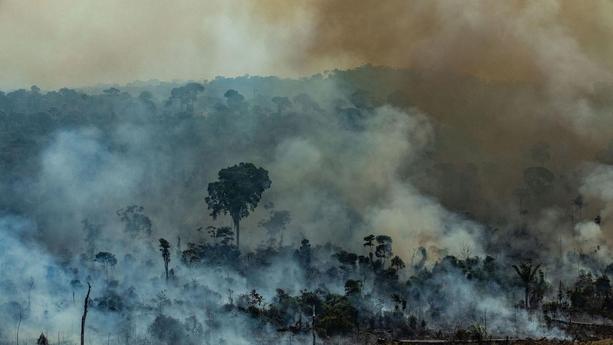Big ecosystems, including reefs, more vulnerable to climate change, study says
 Handout aerial picture released by Greenpeace showing smoke billowing from fires in the forest in the Amazon biome in the municipality of Altamira, Para State, Brazil, on Aug 23, 2019. (Victor MORIYAMA / GREENPEACE / AFP)
Handout aerial picture released by Greenpeace showing smoke billowing from fires in the forest in the Amazon biome in the municipality of Altamira, Para State, Brazil, on Aug 23, 2019. (Victor MORIYAMA / GREENPEACE / AFP)
The Amazon rainforest is often referred to as the lungs of the Earth. But this vast lifeline that pumps oxygen into the atmosphere could cease functioning within the next 50 years, according to a new study.
The study, Regime Shifts Occur Disproportionately Faster in Larger Ecosystems, says large ecosystems such as the Amazon rainforest, Australia's Great Barrier Reef and the Caribbean coral reefs are starting to collapse and could disappear within decades.
ALSO READ: Amazon tribes gather to plan resistance to Brazil government
Scientists from Britain's University of Southampton, the School of Oriental and African Studies, University of London and Bangor University studied data on the changes observed in 40 natural environments on land and in water.
The scientists estimate that an ecosystem the size of the Amazon rainforest, roughly 5.5 million square kilometers, could collapse in 50 years
The scientists found large ecosystems tend to undergo regime shifts more slowly than smaller ones - but the additional time each unit of area buys them as they get larger decreases, and so their collapse occurs relatively more quickly.
They estimate that an ecosystem the size of the Amazon rainforest, roughly 5.5 million square kilometers, could collapse in 50 years.
As climate change makes the forest hotter, it is likely to begin to die back and turn into savanna, according to the study published on March 10 by the open-access journal Nature Communications.
Around 10 million species live in the Amazon. The rainforest also absorbs around 2 billion tons of carbon dioxide each year, making it vital for fighting climate change.
"The danger is to reach a point of no return," said Karina Perez, a Colombian environmental engineer.
Perez, who is also a member of Al Gore's Climate Reality Project initiative, said this "point of no return" is "when the deforestation is such that there is no capacity to recover, and that it already converts the tropical rainforest and savanna forests that do not fulfill the same functions of climatic water regulation of this complex and diverse system that protects the planet and the species as well".
 A handout photo made available by Greenpeace Brazil showing smoke rising from the fire at the Amazon forest in the state of Para, Brazil, Aug 23, 2019. (PHOTO / IC)
A handout photo made available by Greenpeace Brazil showing smoke rising from the fire at the Amazon forest in the state of Para, Brazil, Aug 23, 2019. (PHOTO / IC)
National Geographic last year said 17 percent of the Amazon rainforest had disappeared over the past 50 years. Last year's fires in the Amazon, however, could have increased that figure to around 24 percent.
The Caribbean coral reefs, which cover around 20,000 sq km could take as little as 15 years once triggered, and the same is true for the Great Barrier Reef.
The scientists on this study said the findings "show we need to prepare for dramatic ecological shifts to happen over a 'human' time frame of years and decades".
"Unfortunately, what our paper reveals is that humanity needs to prepare for changes far sooner than expected," said joint lead author Simon Willcock, of Bangor University's School of Natural Sciences.
'Indispensable' protection
Pedro Tunes, co-founder of the scientific portal Tunes Ambiental, said from Brazil that the protection of the Amazon is indispensable not only for the maintenance of all biodiversity in South America but also for the well-being of millions of people around the world.
"The Amazon forest is not only really important on its own, but is also crucial for all South American ecosystems," Tunes said.
"Its destruction could lead to the collapse of all hydrologic cycles in the continent, causing massive waves of hunger and thirst, led by the lack of rain in the interior of this landmass, besides minor impacts all over the Americas and Africa."
To avoid degrading the planet's ecosystem, "we need to do more to conserve biodiversity", said Gregory Coope, a researcher with the School of Oriental and African Studies in London and one of the scientists on the new study.
The study's findings echo those in a paper published in December - Amazon tipping point: Last chance for action.
READ MORE: Fires in Amazon forest rose 30% in 2019
Written by environmental scientist Professor Thomas Lovejoy of George Mason University in the United States and senior researcher Carlos Nobre from the Institute for Advanced Studies at the University of Sao Paulo, Brazil, it said 2019 was the year when the extent of fires and deforestation in the Amazon region garnered full global attention.
"The only sensible way forward is to launch a major reforestation project especially in the southern and eastern Amazon," Lovejoy and Nobre said in their paper.


